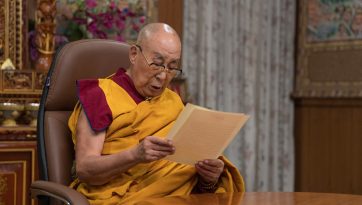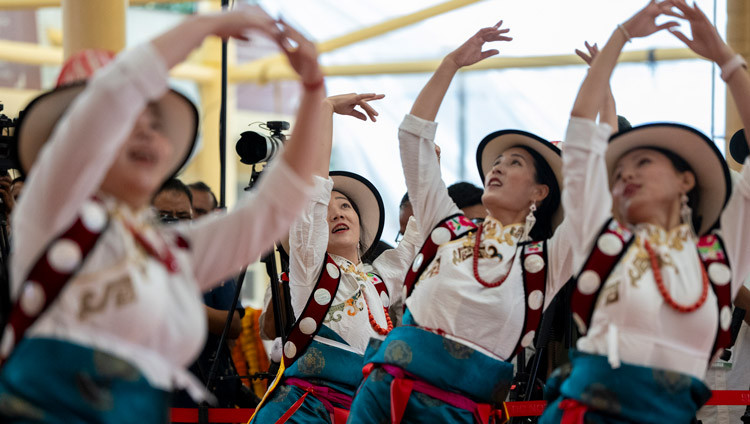India is a model for world to follow
His Holiness the Dalai Lama on Sunday spoke on educating the heart at the prestigious Dalhousie Public School located in northern India, underscoring that India’s religious harmony, democracy and rule of law is a model for others to follow.
Introducing His Holiness to the students, the Principal of the DPS said that His Holiness the Dalai Lama presence made it a ‘red-letter day.’
“I am extremely happy to be here with you, such a large number of young students. As someone approaching his 78th birthday, when I meet young people like you, it makes me feel younger again. Looking at you, in this beautiful wooded environment, I’m aware that people like you are the face of modern India and you will take responsibility for the future,” His Holiness told students of DPS and those from Sacred Heart School and the Guru Nanak Public School.
His Holiness said India and Tibet shares millennia old teacher-student relationship as Buddhism reached Tibet directly from India in the 7th century. “So, historically I regard India as our guru, while we are your chelas, but reliable chelas, because we have retained intact the traditions we received from you. Our relations are not based on economics or politics, but on spiritual affairs,” he said.
“India is the only country where all the world’s major religions live together side by side. This is an expression of true brotherhood and sisterhood. This country is by and large stable and peaceful, rooted as it is in democracy and the rule of law. It is a model for others to follow,” he said.
He remarked that there is a moral crisis in many parts of the world that can be attributed to the material emphasis of modern education. He suggested that this could be rebalanced by introducing inner values such as warm-heartedness by incorporating secular ethics into the modern school curriculum. Secular ethics can involve knowledge of the workings of the mind and emotions that is to be found in ancient Indian thought. What we need, he suggested, is a map of the emotions, a guide to the functioning of the mind. Just as we observe physical hygiene to maintain our physical health, so we need to develop mental and emotional hygiene to ensure that we have healthy minds.
“Think about this. What we need is knowledge and understanding that are education for the brain on the one hand, but also the warm-heartedness that is education for the heart on the other. We are responsible for many of the problems we face, so logically we should be able to deal with them ourselves. And if you can do that, you should be able to build a happier, more peaceful world in the twenty-first century,” His Holiness said.
About his gurus, His Holiness said he’s had 18 gurus with whom he’s studied, but he has great admiration for Mahatma Gandhi, Rajendra Prasad, Vaclav Havel and Willy Brandt. He said he also considered Mao Zedong a great person. About those who have inspired him he mentioned David Bohm and Carl von Weizsacker who taught him about Quantum Physics, Gandhi again, Nelson Mandela and Bishop Desmond Tutu, both of whom worked hard for reconciliation in South Africa.
Finally he was asked what one thing would solve our problems and he answered that most of our problems are related to the mind, so we have to work to reduce our destructive emotions.
Source: Tibet.net




